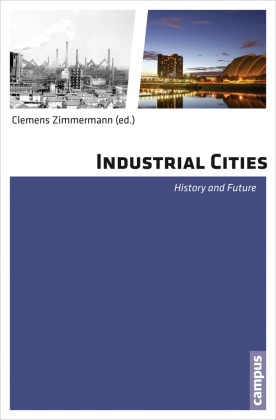Read more
Ob Birmingham, Rotterdam oder Wolfsburg: Industriestädte haben nicht nur völlig unterschiedliche Gesichter, sie unterliegen auch einem bemerkenswerten zeitlichen Wandel. Die Autoren behandeln die Vergangenheit, Gegenwart und Zukunft der Industriestadt als europäisches Phänomen. Aus soziologischer, historischer, geografischer und medialer Perspektive erörtern sie unterschiedliche historische Modelle und Typen von Industriestädten im 19. und 20. Jahrhundert, diskutieren die Frage nach der Zukunft von monostrukturellen Industriestädten sowie mediale Repräsentationsformen industrialisierter Städte.
Mit Beiträgen vonChristoph Bernhardt, Hans-Peter Dörrenbächer, Simon Gunn, Christine Hannemann, Martina Heßler, Martin Jemelka, Henry Keazor, Robert Lewis, Timo Luks, Rebecca Magdin, Jörg Plöger, Richard Rodger, Rolf Sachsse, Adelheid von Saldern, Ondrej Sevecek, Judith Thissen und Clemens Zimmermann.
List of contents
Contents
Foreword9
Introduction: 'Industrial Cities-History and Future'11
Clemens Zimmermann
Part I
Research Perspectives and Historical Developments
Beyond Coketown: The Industrial City in the Twentieth Century29
Simon Gunn
The Contested Industrial City:
Governing Pollution in France and Germany, 1810-193046
Christoph Bernhardt
Echoes of Industrialization: Cities and the Trajectories
of Development66
Richard Rodger
Networks and the Industrial Metropolis: Chicago's Calumet district,
1870-194089
Robert Lewis
Part II
Crisis and Recovery
In-Between: The Conversion of Former Iron and Steel Industry
Sites and Cities in the Saarland-Uneven and Complex
Development Paths117
Peter Dörrenbächer
The Industrial City as a Shrinking City and the Special Case of Flint,
MI142
Christine Hannemann
Crisis in Automotive Cities: The Ambivalent Role of the Car Industry
in the "Autostadt" Wolfsburg and "Motor Town" Detroit165
Martina Heßler
Comeback Cities? Urban Recovery Approaches in European
Industrial Cities188
Jörg Plöger
Part III
Cultural and Sociological Concepts
Fordist Elements of the Industrial City in Germany
and the United States213
Adelheid von Saldern
The Utopian Industrial City: The Case of the Baa City of Zlín
(Republic of Czechoslovakia)235
Martin Jemelka and Ondej Seveek
Social Engineering, the Factory and Urban Environment:
Cadbury/Bournville and Opel/Rüsselsheim (1878-1960)263
Timo Luks
A Town Without Memory? Inferring the Industrial Past:
Clydebank Re-built, 1941-2013283
Rebecca Madgin
Part IV
The Mediated Industrial City
Representing the Industrial City: Rotterdam, 1880-1970307
Judith Thissen
Representations of Industrial Cities in Photo Books and
Promotional Films of the 1950s and 1960s325
Rolf Sachsse
Tradition and Contrast: Industrial Cities and Industrial Work
in the Documentaries of Michael Glawogger: From "Megacities"
(1998) to "Working Man's Death" (2005)345
Henry Keazor
Notes on Contributors362
Index366
About the author
Christine Hannemann ist Dozentin am Institut für Sozialwissenschaften an der Humboldt-Universität Berlin.
Prof. Dr. Martina Heßler lehrt Kultur- und Technikgeschichte an der Hochschule für Gestaltung Offenbach. Ihre Forschungsschwerpunkte sind u.a. die Stadtgeschichte, Technik- und Wissenschaftsgeschichte sowie Visuelle Kulturen.
Timo Luks (Dr. phil.) ist wissenschaftlicher Mitarbeiter am Institut für Europäische Geschichte der Technischen Universität Chemnitz. Zu seinen Arbeitsschwerpunkten gehören die Geschichte der Industriegesellschaft und die Geschichte politisch-sozialer Ordnungsvorstellungen seit dem 19. Jahrhundert.
Summary
Ob Birmingham, Rotterdam oder Wolfsburg: Industriestädte haben nicht nur völlig unterschiedliche Gesichter, sie unterliegen auch einem bemerkenswerten zeitlichen Wandel. Die Autoren behandeln die Vergangenheit, Gegenwart und Zukunft der Industriestadt als europäisches Phänomen. Aus soziologischer, historischer, geografischer und medialer Perspektive erörtern sie unterschiedliche historische Modelle und Typen von Industriestädten im 19. und 20. Jahrhundert, diskutieren die Frage nach der Zukunft von monostrukturellen Industriestädten sowie mediale Repräsentationsformen industrialisierter Städte.
Mit Beiträgen vonChristoph Bernhardt, Hans-Peter Dörrenbächer, Simon Gunn, Christine Hannemann, Martina Heßler, Martin Jemelka, Henry Keazor, Robert Lewis, Timo Luks, Rebecca Magdin, Jörg Plöger, Richard Rodger, Rolf Sachsse, Adelheid von Saldern, Ondrej Sevecek, Judith Thissen und Clemens Zimmermann.
Additional text
"A stimulating and valuable contribution to the field of urban history." Jörg Arnold, H-Soz-u-Kult, 20.03.2014
Report
"A stimulating and valuable contribution to the field of urban history." Jörg Arnold, H-Soz-u-Kult, 20.03.2014

